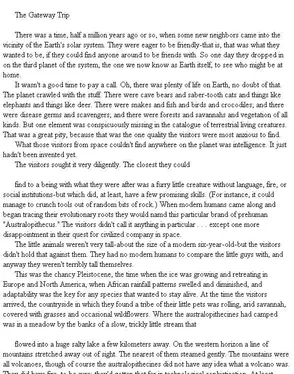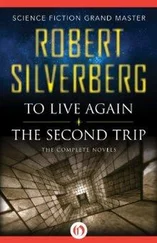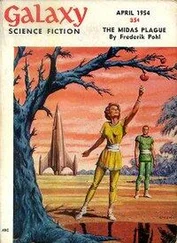Pohl, Frederik - The Gateway Trip
Здесь есть возможность читать онлайн «Pohl, Frederik - The Gateway Trip» весь текст электронной книги совершенно бесплатно (целиком полную версию без сокращений). В некоторых случаях можно слушать аудио, скачать через торрент в формате fb2 и присутствует краткое содержание. Жанр: Старинная литература, на английском языке. Описание произведения, (предисловие) а так же отзывы посетителей доступны на портале библиотеки ЛибКат.
- Название:The Gateway Trip
- Автор:
- Жанр:
- Год:неизвестен
- ISBN:нет данных
- Рейтинг книги:4 / 5. Голосов: 1
-
Избранное:Добавить в избранное
- Отзывы:
-
Ваша оценка:
- 80
- 1
- 2
- 3
- 4
- 5
The Gateway Trip: краткое содержание, описание и аннотация
Предлагаем к чтению аннотацию, описание, краткое содержание или предисловие (зависит от того, что написал сам автор книги «The Gateway Trip»). Если вы не нашли необходимую информацию о книге — напишите в комментариях, мы постараемся отыскать её.
The Gateway Trip — читать онлайн бесплатно полную книгу (весь текст) целиком
Ниже представлен текст книги, разбитый по страницам. Система сохранения места последней прочитанной страницы, позволяет с удобством читать онлайн бесплатно книгу «The Gateway Trip», без необходимости каждый раз заново искать на чём Вы остановились. Поставьте закладку, и сможете в любой момент перейти на страницу, на которой закончили чтение.
Интервал:
Закладка:
And if anyone still felt that Earth was not giving him all he chose to desire-there was always the rest of the galaxy.
That was what the meat people had. What the machine-stored had, of course, was much more. It was everything. Everything they had ever wanted, and everything they could imagine.
Really, there was only one real problem with machine storage after death, and that was relative time.
That couldn't be helped. Machines move faster than meat. In the interactions between the machine-stored and the meat persons they had left behind, it was a considerable handicap to conversation. The machine-stored found the meat people desperately boring.
It was easy enough for the still-living to talk with their dear departed (because the dear departed hadn't really departed any farther than the nearest computer terminal), but it was not a lot of fun. It was as bad as trying to make small talk with the Sluggards all over again. While the flesh-and-blood person was struggling to complete a single question, his machine-stored "departed" had time to eat a (machine-stored) meal, play a few rounds of (simulated) golf, and "read" War and Peace.
The fact that the machine-stored moved so much faster brought about some emotional problems for their meat relicts, too. It was particularly disconcerting right after a death. By the time the funeral was over, and the bereft put in a call for the one who had gone before, the one who had gone on had likely gone to take a relaxing, if simulated, cruise through the (also simulated) Norwegian fjords, learned to play the (unreal) violin, and made a hundred new machine-stored friends. The survivors might still have tear stains on their cheeks, but the deceased had almost forgotten his dying.
In fact, when he thought about his life in the flesh his feelings were probably nostalgic, but also quite glad all that was over-like any elderly adult remembering his own blundering, confused, worried childhood.
As one small consequence, machine-storage put the undertakers out of business. The machine-stored did not need a mausoleum to be remembered. Deaths were still marked by ceremonies, but they were more like a wedding reception than a wake; the business went to caterers rather than funeral directors.
Psychologists worried about this for a while. With the dead still
(sort of) alive, and even reachable, how would the bereaved manage their grief?
When push came to shove, the answer was obvious. Grief wasn't a problem. There wasn't much to grieve.
Unfortunately, full stomachs and comfortable lives do not necessarily make human beings good.
Such things probably do help, a little. Nevertheless, the worms of ambition and envy that live in the human mind are not easily sated. As far back as the twentieth century it was observed that the manual laborer who managed to promote himself from cold-water flat to a ranch house with a VCR and a sports car could still feel pangs of envy toward his neighbor with the jacuzzi and the thirty-two-foot cabin cruiser.
The human race didn't change just because they had acquired Heechee technology. There were still people who wanted what other people had badly enough to try to take it away from them.
So theft did not disappear. Nor did thwarted lovers, or brooding victims, or simple psychopaths who tried to heal their grievances by means of rape, assault, or murder.
An earlier age took care of such people either by caging them in penitentiaries (but the prisons turned out to be mere finishing schools for crime) or turning them over to the executioner (but was murder any less premeditated murder simply because it was the state that was doing it?).
The Age of Gold had better ways. They were less revengeful, and maybe less satisfying to some of the punishment-minded. But they worked. Society was at last fully protected from its renegades. If there were still prisons (and there were), they were manned by computer-driven robot guards who neither slept nor took bribes. Better than prisons, there were planets of exile, where severe offenders could be deported. A criminal dropped on a low-tech planet
could probably feed himself and continue to live, but there was no way he could ever build himself an interstellar spaceship to get back to civilization.
And for the worst cases, there was HereAfter.
Their minds faithfully reproduced in machine storage, their bodies no longer mattered. They could be disposed of without a qualm. It was capital punishment without its depressingly final aspects. After the sentence was carried out, the criminals weren't dead. They were still alive-after a fashion, anyway-but they were rendered permanently harmless. From that sort of prison no one ever was paroled, and no one could ever manage to escape.
All it required in order to make all these things happen, given the knowledge of the devices themselves, was energy.
There, too, the Heechee came through. The secret of Heechee power generation came out of study of the core of the Food Factory; and it was cold fusion. It was the same compression of two atoms of hydrogen into one of helium that went on in the core of any star, but not at those same temperatures. The output heat of the reaction came at about 900 Celsius-a nearly ideal temperature for generating electricity-and the process was safe.
So the power was there. It was cheap. And it put ten thousand fuel-burning power plants out of business, so that the carbon-dioxide greenhouse warmup of the Earth came to a halt, and the pollution of Earth's air stopped overnight. Small vehicles burned hydrogen or ran by flywheel kinetic-energy storage. Everything else took its power off the grids.
Things were really getting to be very nice on Earth, because human technology hadn't stopped, either.
For not everything in mankind's flowering of science and technology was a gift from the Heechee. There were computers, for instance.
Human computers were intrinsically better and more advanced than those of the Heechee, because the Heechee had never gone the adding-machine-to-mainframe route. Their methods of dealing with data handling were quite different, and in some ways not as good. Once the human scientists had begun to figure ways of adding Heechee refinements to the already powerful human machines, there was an explosion of knowledge that sparked new technologies in every part of human life.
Quantum-effect devices had long since replaced the clumsy doped silicon microchips, and so computers had become orders of magnitude faster and better. No one had to tap out a program on a keypad any more. He told the computer what he wanted done, and the computer did it. If the instructions were inadequate, the computer asked the right questions to clear it up-it was face-to-face communication, a machine-generated hologram speaking to its flesh-and-blood master.
Heechee food and Heechee power ... human computers Heechee biochemistry allied to human medicine
The human world at last allowed true humanity to every persoh who lived on it. And if, even so, any human wanted more, there was a whole galaxy waiting for him that was now within his reach.
There remained the burning and never-forgotten question of the Heechee themselves.
They were elusive. Their works were everywhere, but no one had ever seen a living Heechee, though every last Gateway explorer had wanted to look, and almost every human on Earth dreamed (or had nightmares) of what they would be like when found.
Arguments raged. Answers were scarce. The prevailing theory was that somehow, in some tragic way, the Heechee had died off. Perhaps they had killed themselves in a catastrophic war. Perhaps they had, for reasons not known, emigrated to a distant galaxy.
Perhaps they had suffered a universal plague-or reverted to barbarism-or simply decided that they no longer wanted to bother with traveling through interstellar space.
Читать дальшеИнтервал:
Закладка:
Похожие книги на «The Gateway Trip»
Представляем Вашему вниманию похожие книги на «The Gateway Trip» списком для выбора. Мы отобрали схожую по названию и смыслу литературу в надежде предоставить читателям больше вариантов отыскать новые, интересные, ещё непрочитанные произведения.
Обсуждение, отзывы о книге «The Gateway Trip» и просто собственные мнения читателей. Оставьте ваши комментарии, напишите, что Вы думаете о произведении, его смысле или главных героях. Укажите что конкретно понравилось, а что нет, и почему Вы так считаете.












